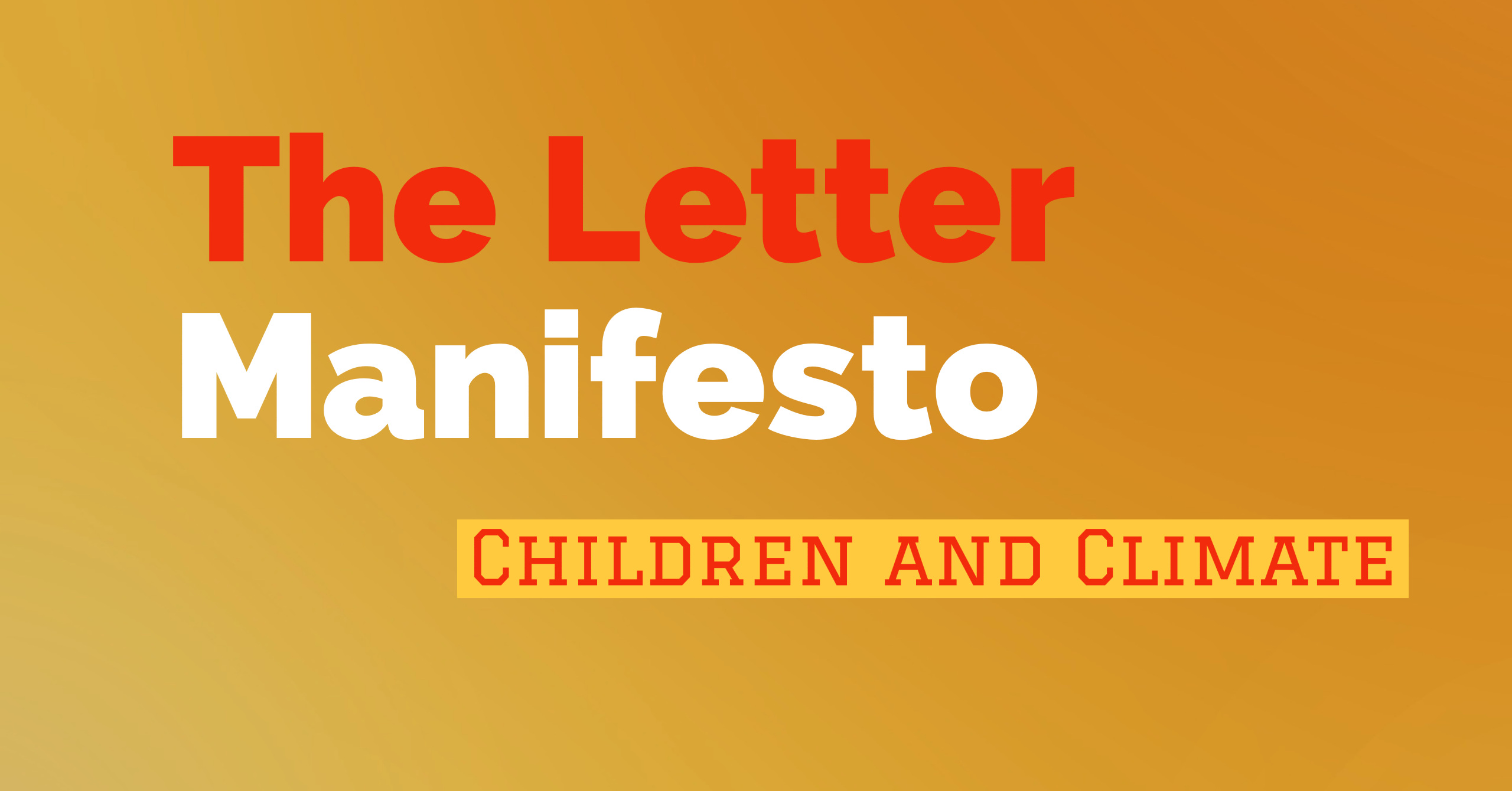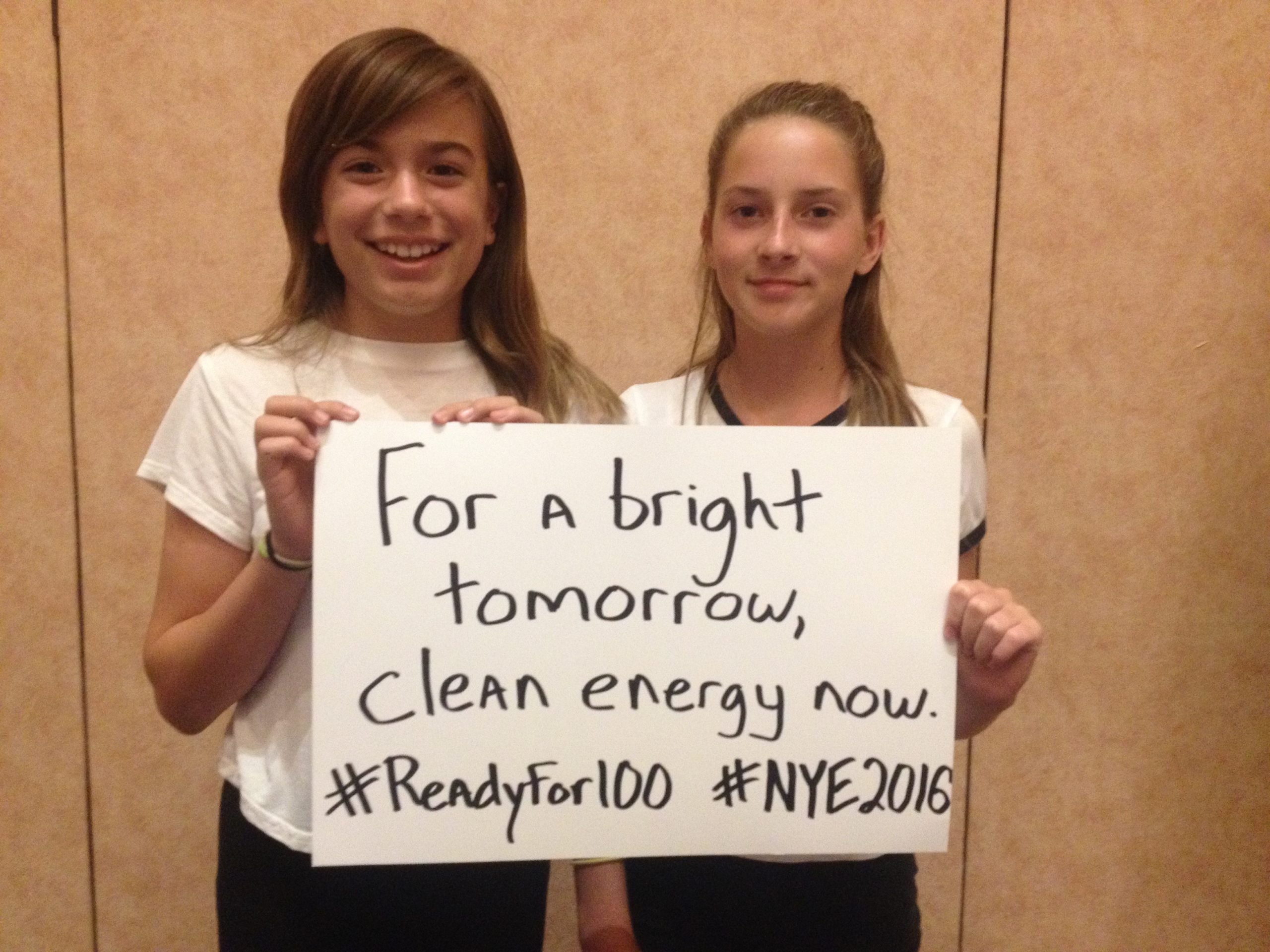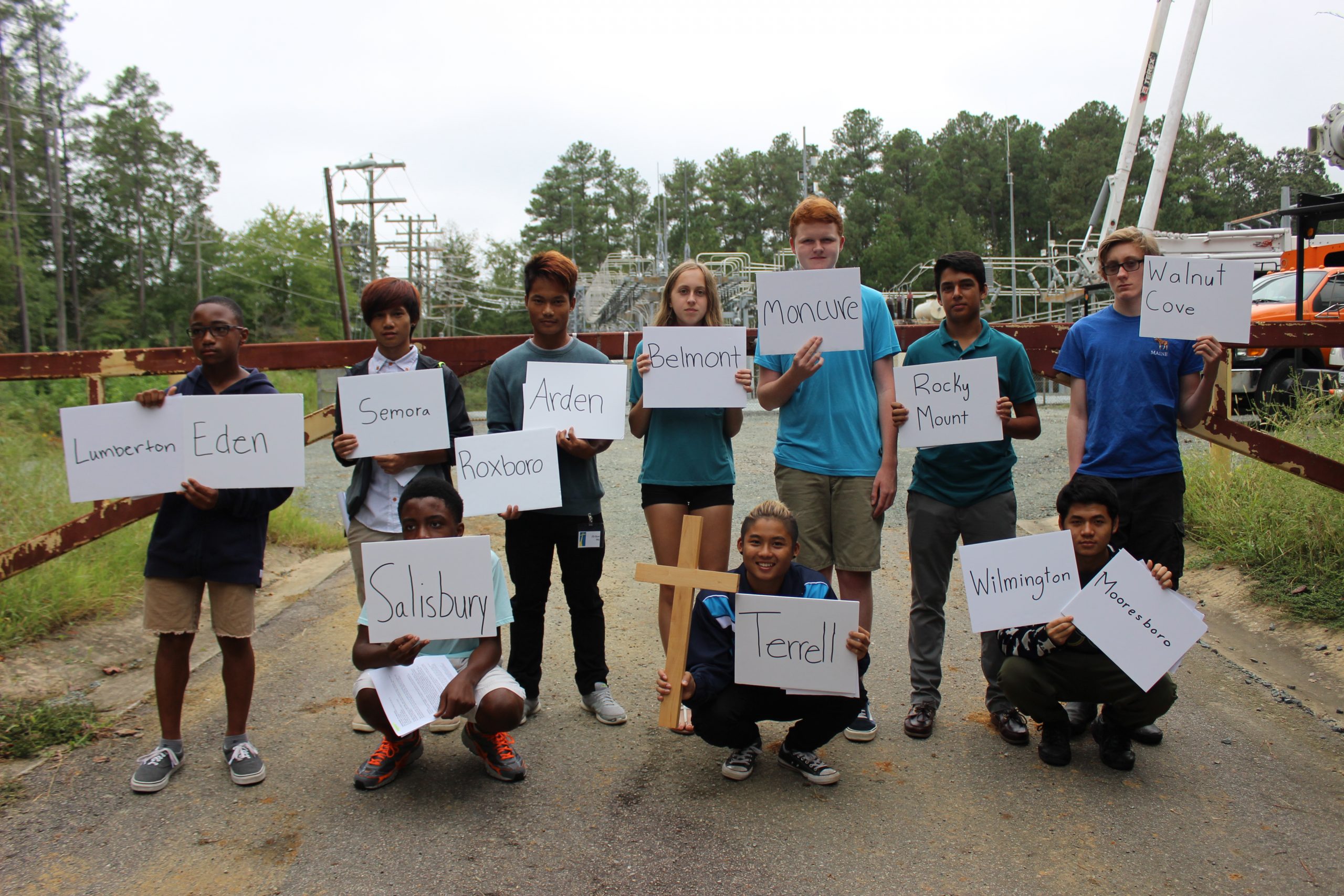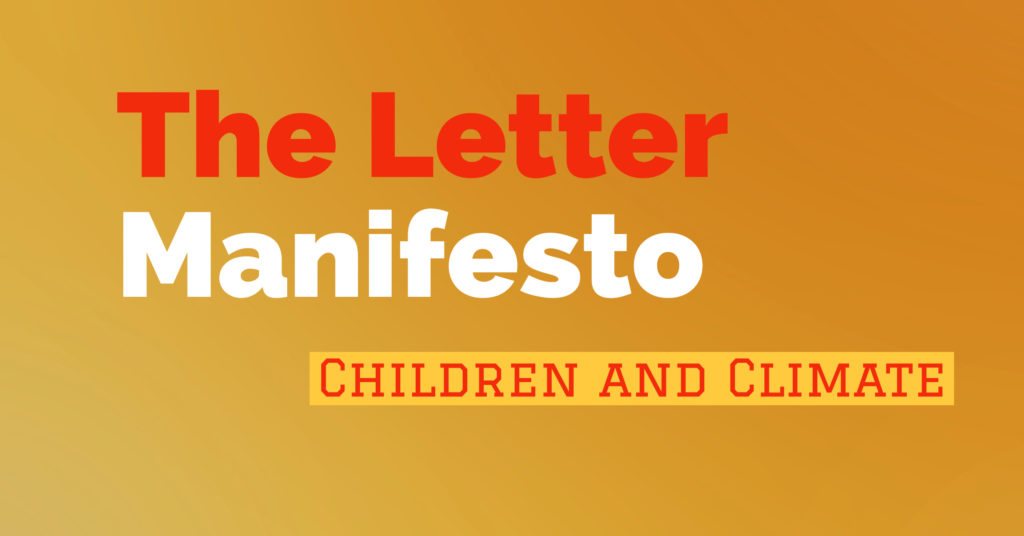The Letter Manifesto: Children and Climate

Dear Parents, Grandparents, and Anyone Who Has a Heart for Children,
Let me begin with a confession: I admit to being an imperfect parent. I often consciously make mistakes as a parent while having little idea of what would be the better alternative. Among the great mysteries of life for me is how to get one’s children ready and out the door by 8 am while simultaneously living out a steadfast, unwavering commitment to world peace. I readily sympathize with anyone who has struggled with caring madly for children while simultaneously feeling overwhelmed by the task of it. Thus, I write this letter in a spirit of commiseration. I also write it in the spirit of one seeking companions in a common struggle. I write as one who is so in love with his children and so concerned about their fate that I feel I have no option but to reach out to others, so that we might join in arms of encouragement as we face what many have rightly argued is the most important challenge of our generation.
I truly believe that the future of our children and of our planet depends in significant part upon us—parents, grandparents, and anyone who has a heart for children. I arrived at this conviction through a journey that began with both a plane flight and a car ride. In what was a difficult decision for my wife and I to make, a little over two years ago we moved our family from the state of Washington to Cleveland, Ohio. The main motivation was a change of career for me. For the previous eight years, I had served as the pastor of a church, and during that time, I had become increasingly concerned about the environment. It had become my core passion. While I had never previously considered being anything other than a pastor, that all changed when I discovered that I could work on environmental justice issues full-time.
So it was that my family found itself on a plane bound for Cleveland. My new work not only seemed like the fulfillment of a dream, but it also induced more dreams of energizing and mobilizing people to act, especially in addressing the state of our warming planet. But then I had my first reality check. It came in a car ride during which I utterly failed in one of my first attempts to communicate effectively on the environment as I embarked upon my new career. I faced a tough but honest audience of one person: my wife. We sailed along Highway 271 as I proceeded to share with her a rather concise doom and gloom scenario about the fate of planet earth due to the damage done to our climate. My message was essentially along the lines of “humanity better gets its act together soon or we are all going to hell in a hand basket.” My wife informed me in no uncertain terms that what I was saying in no way motivated her to care for the environment. In fact, it was having the opposite effect.
Of course, at the time, I thought it was my wife who had the problem. As I saw it, I was just being a truth-teller, and sometimes people don’t like the truth. That’s just the way it is when you are a prophet I reasoned, but I have since learned a few things. One is that my wife was right. When it comes to addressing our climate, doom and gloom doesn’t work for a lot of people, except for a small slice of the population predisposed to be activists. The reasons for this are understandable. It can be overwhelming enough to have all sorts of immediate needs flying at you from work and home. Yet, somewhere between finding a non-creepy babysitter you can trust with your five-year-old and figuring out how to pay for your two-year-old’s 40 hour-a-week nursery care, one is also expected to worry about saving the planet. In looking at it from this perspective, I came to realize why a lot of people respond to the doom and gloom alarm by hitting the snooze button. “I will just worry about all of Earth later.”
Still, somehow many of us who are consumed with worry over the daily welfare of kids have also gotten involved in addressing our climate. I have come to believe that rather than being a barrier to joining the climate cause, our loving, sometimes anxious, inclinations actually spur and motivate involvement. This has certainly been true for me. Around eight years ago, I got involved in my first environmental campaign as a relatively new pastor. It was a campaign to transition the state of Washington away from its only coal plant. The plant was the largest source of CO2 pollution in the state, and that was initially the motivating factor for me. I had read enough articles about the dire circumstances of our planet to realize that something had to be done to significantly reduce greenhouse gas emissions from giving mother earth a severe fever with deadly consequences.
The content and contours of my motivations, however, soon began to change without my hardly being aware of it. In the midst of that ultimately successful campaign aimed at Washington’s coal pollution, my wife became pregnant, and we had our first child. Soon I began to think more and more about how children were impacted by the burning of fossils fuels. Back then, I was especially concerned with the mercury pollution that was coming from the coal plant. I would read these medical reports about how mercury can lead to the neurological impairment of developing fetuses and infants. As a father-in-the-making, I couldn’t shake this deeply troubling and upsetting reality. I felt compelled to act, so without any real skills at web design I created a website called “The Moral Math of Mercury.” Probably, only five people ever looked at it. In looking back on that moment, however, I now realize that period was the beginning of a shift. I soon began to look at every environmental cause in which I became involved through the lens of being a parent and caring about children. When a proposal was made to place the largest marine oil terminal in the country in the city where I lived and pastored, I couldn’t fathom any parent wanting to raise children anywhere near it when I read about the pollutants that would come from it and the potential for oil train explosions, and an oil train explosion did later occur further up the river. My passion for addressing this issue was kindled all the more when I realized that the children who would be most affected by the proposed oil terminal lived in a part of the city in which residents were more likely to be of color and come from lower-income homes.
Despite my building concern for the plight of children, it was not until after my wife’s candid feedback that I had my “Aha!” moment. Her comments made me realize that I needed to get in touch with what moved and compelled people to act. I asked myself, “Why would anyone get involved in addressing our climate?” This seemed like the most important question in the world to me, and soon all the climate activists around me became specimens from which to collect data. While I observed more than one motivation that drove people to act, it quickly became evident that a love of children often played the strongest role. Over and over again, I encountered people who cared with a deep passion for the children now inheriting our world. I met grandparents who showed up to rallies and performed civil disobedience while holding photos of their grandkids. I met parents who were transformed into activists and community organizers by threats as real and as tangible as coal ash. I met teenagers who would publicly tear up when thinking about the potential impact of oil spills on those younger than themselves.
While a love of children seemed to be surfacing everywhere I went, I also found that this animating love that drives so many of us is not named nearly enough. When it is named, I often find the eyes of those gathered quickly glistening. The palpable response always leaves me with the feeling that not even empires or giant corporations can withstand this love that so many feel. Thus, I came to feel the need to pen this manifesto and to pen it as a letter, because I believe there is an intimate connection shared when those with a heart for children come together.
I have become convinced that each one of us may be more important than we might initially realize. The problem we face today isn’t an intellectual one. It is a motivational one. Polls tell us that the majority of people believe in the reality of climate change and that renewable energy is what we need. Moreover, there are brilliant people who have outlined viable solutions for turning us around from our current race toward the cliff’s edge. There is Stanford’s Mark Jacobson who has outlined plans for how all 50 states in our country can reasonably shift to clean, affordable, and renewable energy. There is now a bestselling book entitled Drawdown: The Most Comprehensive Plan Ever Proposed to Reverse Global Warming. The solutions are there, but what is lacking is the critical mass of people who are willing to act.
This is why I have come to believe that we—parents, grandparents, and people who have a heart for children—are so vitally critical. It is not that we ourselves are so great. After all, we collectively bear substantial responsibility for getting our planet into this mess. Rather, we are critical to saving the day for a reason that for me, as a Christian, is ultimately theological. It all comes down to the love that is within and among us—a love that Christians see as being no less than God. As imperfect as we might be, we are still vessels and instruments of this divine love.
Whether or not you—the reader—hold the same theology or belief is not my concern in writing this letter manifesto. What I am concerned about is a love for children around which I believe many of us can unite regardless of our faith or persuasion. Of course, if you are anti-children, you can go ahead and stop reading this, or better yet, share it with someone who is in favor of children having healthy, thriving lives both now and in the future. I am sure you know someone. Maybe even your own parents.
Every generation has its calling, and I believe this is ours. Yet, I can see how for some this calling might initially feel like one to resist. Who wants to add “save the planet” to their already overloaded to-do list? But I think there is another way of viewing our present situation, and it relates to this notion of love. A lot of what I do as a parent in caring for my children is not what I would call effortless but would nevertheless consider a routine part of parenting. On a daily basis, I help provide food, shelter, and clothing for my daughters. I do that without any real conscious thought. I don’t wake up in the morning and say, “Do I love my daughters enough to give them breakfast?” I just do it, and yet I can say that I do such basic actions out of love.
So it is that I have come to the conclusion that one of the essential acts of love in caring for a child or grandchild today is to do something about the state of our climate. Just as I help provide food, shelter, and clothing for my daughters, I want to do whatever I can to secure a decent future for them, to make our world as safe and as hospitable as it can be. I would never say: “Oh, I can’t feed and clothe my kids today, because I can’t possibly handle yet another thing on my to-do list.” The idea of not caring enough to look after their fundamental wellbeing seems unimaginable to me.
My hunch is that many parents, grandparents, and general fans of kids feel the same, so I am betting all of my moral and spiritual chips on you. I am betting that you will be the vessels of love that the world so desperately needs right now. May we answer our generation’s calling with self-compassion as we carefully balance our piled-high plates, but let’s also answer it with compassion for our children, so that we pass onto them the best that our world has to offer.
With gratitude for each one of you,
Brooks

The Rev. Dr. Brooks Berndt is the Minister for Environmental Justice for the United Church of Christ. The Letter Manifesto serves as the beginning of a new column he writes entitled “For the Love of Children.”
Related News
The Antidote to Power from Above
With its themes of moral reckoning and repentance, this Lenten season brings into stark relief...
Read MoreDon’t Incinerate – Innovate!
Thirty-eight years ago, the United Church of Christ's Commission for Racial Justice released a...
Read MoreThe Racial History of a Church’s Land
In 1859, Oregon joined the Union as the only free state with an exclusion clause in its...
Read More

